
FACULTY OF ARTS AND SCIENCES
Department of Sociology
GEAR 203 | Course Introduction and Application Information
| Course Name |
Masterpieces in Music History
|
|
Code
|
Semester
|
Theory
(hour/week) |
Application/Lab
(hour/week) |
Local Credits
|
ECTS
|
|
GEAR 203
|
Fall/Spring
|
3
|
0
|
3
|
4
|
| Prerequisites |
None
|
|||||
| Course Language |
English
|
|||||
| Course Type |
Service Course
|
|||||
| Course Level |
First Cycle
|
|||||
| Mode of Delivery | - | |||||
| Teaching Methods and Techniques of the Course | - | |||||
| Course Coordinator | - | |||||
| Course Lecturer(s) | ||||||
| Assistant(s) | - | |||||
| Course Objectives | The aim of this course is to learn the masterworks of music and to identify the essential differences between them and any ordinary work. |
| Learning Outcomes |
The students who succeeded in this course;
|
| Course Description | Through this course masterworks of music and basic information on those works will be presented |
|
|
Core Courses | |
| Major Area Courses | ||
| Supportive Courses | ||
| Media and Management Skills Courses | ||
| Transferable Skill Courses |
WEEKLY SUBJECTS AND RELATED PREPARATION STUDIES
| Week | Subjects | Related Preparation |
| 1 | Orientation and introduction to the course | Orientation and introduction to the course |
| 2 | Beethoven: Symphony no 5 | Beethoven: Symphony no 5 |
| 3 | Bach toccata and fugue BWV 565, Mozart Symphony no 40 | Bach toccata and fugue BWV 565, Mozart Symphony no 40 |
| 4 | Beethoven Symphony no 7 | Beethoven Symphony no 7 |
| 5 | Dvorak: Symphony no 9 “From the new world” | Dvorak: Symphony no 9 “From the new world” |
| 6 | Grieg: Piano Concerto Grieg: Peer Gynt Suit | Grieg: Piano Concerto Grieg: Peer Gynt Suit |
| 7 | Beethoven: Symphony no 9 | Beethoven: Symphony no 9 |
| 8 | Tchaikovsky: Piano Concerto | Tchaikovsky: Piano Concerto |
| 9 | Mozart Don Giovanni act1 | Mozart Don Giovanni act1 |
| 10 | Mozart Don Giovanni act 2 | Mozart Don Giovanni act 2 |
| 11 | Midterm | |
| 12 | Carl Orff: Carmina Burana | Carl Orff: Carmina Burana |
| 13 | Bach: Coffee Cantata Bach: Concerto for 2 pianos in C major | Bach: Coffee Cantata Bach: Concerto for 2 pianos in C major |
| 14 | Liszt Piano Concerto no 1 Mendelssohn Violin Concerto op 64 | Liszt Piano Concerto no 1 Mendelssohn Violin Concerto op 64 |
| 15 | Student Presentation | |
| 16 | General evaluation |
| Course Notes/Textbooks | Powerpoint Presentation and Personal Archive |
| Suggested Readings/Materials | Sadie, Stanley Grove Music Dictionary |
EVALUATION SYSTEM
| Semester Activities | Number | Weigthing |
| Participation |
1
|
10
|
| Laboratory / Application | ||
| Field Work | ||
| Quizzes / Studio Critiques | ||
| Portfolio | ||
| Homework / Assignments |
1
|
15
|
| Presentation / Jury |
1
|
15
|
| Project | ||
| Seminar / Workshop | ||
| Oral Exams | ||
| Midterm |
1
|
25
|
| Final Exam |
1
|
35
|
| Total |
| Weighting of Semester Activities on the Final Grade |
4
|
65
|
| Weighting of End-of-Semester Activities on the Final Grade |
1
|
35
|
| Total |
ECTS / WORKLOAD TABLE
| Semester Activities | Number | Duration (Hours) | Workload |
|---|---|---|---|
| Theoretical Course Hours (Including exam week: 16 x total hours) |
16
|
3
|
48
|
| Laboratory / Application Hours (Including exam week: '.16.' x total hours) |
16
|
0
|
|
| Study Hours Out of Class |
14
|
2
|
28
|
| Field Work |
0
|
||
| Quizzes / Studio Critiques |
0
|
||
| Portfolio |
0
|
||
| Homework / Assignments |
1
|
8
|
8
|
| Presentation / Jury |
1
|
10
|
10
|
| Project |
0
|
||
| Seminar / Workshop |
0
|
||
| Oral Exam |
0
|
||
| Midterms |
1
|
8
|
8
|
| Final Exam |
1
|
8
|
8
|
| Total |
110
|
COURSE LEARNING OUTCOMES AND PROGRAM QUALIFICATIONS RELATIONSHIP
|
#
|
Program Competencies/Outcomes |
* Contribution Level
|
||||
|
1
|
2
|
3
|
4
|
5
|
||
| 1 | To have the knowledge of classical and contemporary theories in sociology, and be able to comparatively analyze these theories. |
|||||
| 2 | To have the knowledge of main methodological approaches in sociology as well as social research and data analysis methods. |
|||||
| 3 | To have knowledge in the fields of general sociology, sociology of institutions, social structure and change, and applied sociology. |
|||||
| 4 | To be able to determine the appropriate methods in the design of the planning stage and conclusion of a sociological project, individually or as part of a team. |
|||||
| 5 | To be able to diagnose the social dynamics behind personal problems by using sociological imagination. |
|||||
| 6 | To be able to define social problems at local, national, and global level, and offer new policies for solutions. |
|||||
| 7 | To be able to apply commonly-used computer programs for data collection and analysis in sociological research. |
|||||
| 8 | To be able to develop a socially responsible, scientific and ethical perspective regarding the collection, analysis, interpretation and presentation of data. |
|||||
| 9 | To be able to analyze different aspects of the social world by drawing on the knowledge produced by other disciplines of the social sciences. |
|||||
| 10 | To be able to constantly renew herself/himself professionally by following scientific and technological developments in sociology and social research. |
|||||
| 11 | To be able to collect sociological data and communicate with sociologists and other social scientists in a foreign language ("European Language Portfolio Global Scale", Level B1). |
|||||
| 12 | To be able to speak a second foreign at a medium level of fluency efficiently. |
|||||
| 13 | To be able to relate the knowledge accumulated throughout the human history to their field of expertise. |
|||||
*1 Lowest, 2 Low, 3 Average, 4 High, 5 Highest
NEWS |ALL NEWS
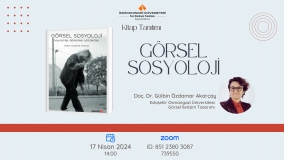
Book Presentation and Talk: Visual Sociology
Department of Sociology invites you to the Book Presentation and Talk event with Gülbin Özdamar Akarçay, the author of “Visual Sociology". Date:
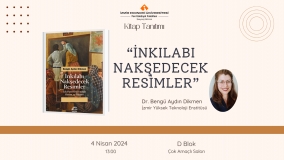
Book Presentation and Talk: Painting the Revolution
Department of Sociology invites you to the Book Presentation and Talk event with Dr. Bengü Aydın Dikmen, the author of “Painting the
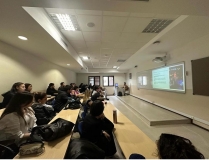
We welcomed ethnomusicologist Onur Sönmez.
We held our sociology seminar where we hosted ethnomusicologist Onur Sönmez. We thank him very much for this detailed and interesting presentation.
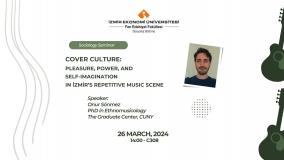
Cover Culture: Pleasure, Power, and Self-Imagination in İzmir’s Repetitive Music Scene
You are cordially invited to the Sociology Seminar where we will host Dr. Onur Sönmez. Onur Sönmez has a PhD in ethnomusicology
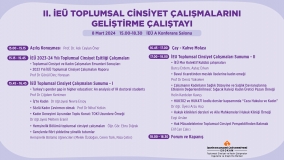
II. IUE GENDER STUDIES DEVELOPMENT WORKSHOP (EKOKAM- Gender and Women’s Studies Research and Application Center)
Research Assistant Helin Kardelen Kavuş attended the “II. IUE Gender Studies Development Workshop” on March 8, 2024, International Women's Day. Organized by EKOKAM, the workshop
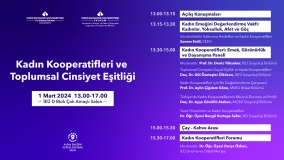
Women’s Cooperatives and Gender Equality
You are cordially invited to "Women's Cooperatives and Gender Equality", which will be co-organized by IUE EKOKAM, the Department of Sociology, and
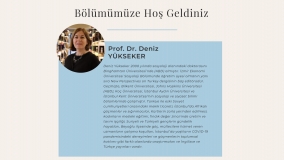
Welcoming Our New Faculty Member: Professor Deniz Yükseker
We are proud to welcome and introduce our newest faculty member: Professor Deniz Yükseker. We wish her all the best and success
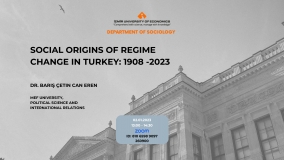
Sociology Seminar: Social Origins of Regime Change in Turkey: 1908 -2023
Department of Sociology cordially invites you to a seminar on "Social Origins of Regime Change in Turkey: 1908 - 2023" by Dr.



